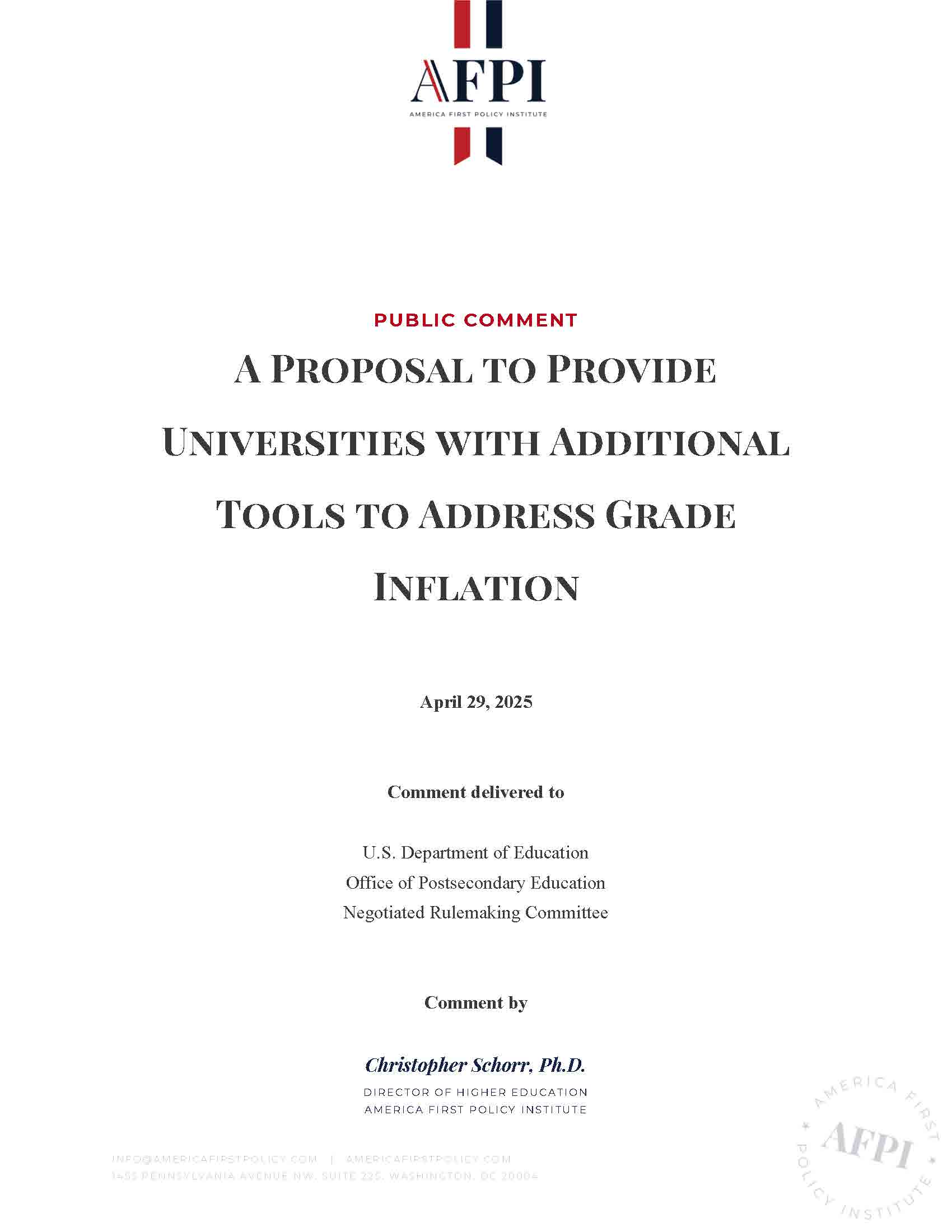A Proposal to Provide Universities with Additional Tools to Address Grade Inflation
Good morning. I am Dr. Chris Schorr. I serve as Director of Higher Education at the America First Policy Institute. My comments today concern data reporting to the National Center for Education Statistics. I propose that the Department of Education help institutions of higher education to combat grade inflation by leveraging its data reporting authorities under the Higher Education Act to require Title IV schools to report average standardized test scores.
Under this proposal, Title IV schools would report mean SAT and ACT scores at the course and department levels. The Department would then make these data publicly available through the Integrated Postsecondary Data System.
Public access to these data would enable education researchers to better measure academic rigor. Absent these data, grade point average comparisons between departments cannot account for noncomparable student populations. If, for example, students enrolled in critical disabilities studies and biomedical engineering earn comparable GPAs, it is not obvious that the two fields are equally rigorous.
Accounting for student aptitude would enable universities to craft better-calibrated remedies for grade inflation. For example, a course or department-level cap on the proportion of “A” grades could be adjusted by department or even overtime. Without such adjustments, across-the-board caps could discourage students from majoring in more demanding fields of study. Paradoxically, this would exacerbate a known cause of grade inflation: students shifting from more to less rigorous disciplines.[i]
Grade inflation must be addressed because current trends are unsustainable. Graders—for example, professors and grad students—have strong incentives to treat students like “customers,” and to keep them happy.[ii] Lax grading not only makes like easier, it also contributes to more favorable ratings from students. For professors, these ratings factor into tenure and promotion decisions.
Grades communicate information about student aptitude, including subject matter mastery, diligence, and skill. Grade inflation impedes the ability of grades to communicate this information, rendering excellent students indistinguishable from merely competent students. Due to grade inflation, graduate admissions officers and employers are now forced to evaluate applicants by other, often less useful means.[iii] Research has also linked grade inflation to reduced student learning and achievement.[iv]
The proposed regulation relies on existing statutory authorities. It is minimally burdensome. It does not risk student privacy—because no individual’s test score could be inferred from a course or department average. Importantly, this proposal also does not prescribe any solutions for grade inflation or preempt universities in any way. It merely provides information to help education researchers (and ultimately, universities) to develop more effective solutions to grade inflation.
Thank you.
[i] Hernández-Julián, R., & Looney, A. (2016). Measuring Inflation in Grades: An Application of Price Indexing to Undergraduate Grades. Economics of Education Review, 55: 220-232. https://www.sciencedirect.com/science/article/abs/pii/S0272775716303806.
[ii] Rojstaczer, S. (2023). Grade Inflation at American Colleges and Universities. Gradeinflation.com. https://archive.ph/AZrP0.
[iii] Nickolas, K. (2024, November 8). Grade Inflation at Harvard: What Does It Mean for Academic Rigor? Crimson Education. https://www.crimsoneducation.org/us/blog/grade-inflation-at-harvard:/; Cerullo, M. (2023, December 5). More U.S. Companies No Longer Requiring Job Seekers to have a College Degree. CBS News. https://www.cbsnews.com/news/college-degree-job-requirement/.
[iv] Arum, R., & Roksa, J. (2011). Academically Adrift: Limited Learning on College Campuses. University of Chicago Press.
